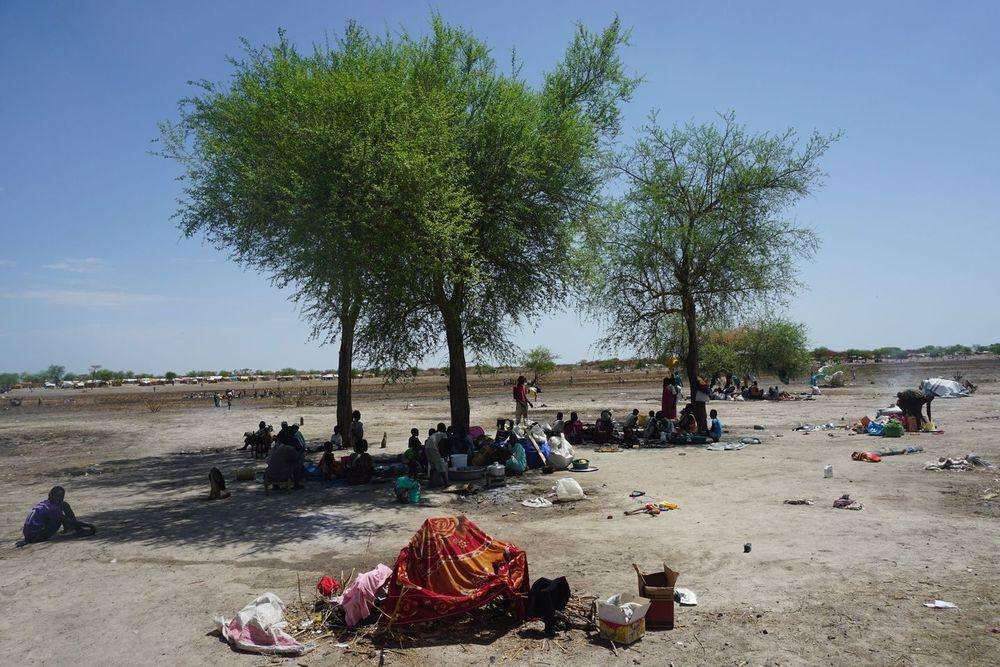THOUSANDS REPEATEDLY DISPLACED BY SOUTH SUDANESE CONFLICT NOW MAKING DESPERATE JOURNEY TO SUDAN
As conflict spreads in the former Upper Nile State, more than 20,000 South Sudanese refugees have fled horrendous living conditions and fighting around the Aburoc camp for internally displaced people (IDPs), crossing the border to reach Sudan’s increasingly overcrowded refugee camps. While many more of the estimated 18,000 people left behind will take the road north, others will stay in Aburoc, hoping that desperately needed clean water, food, and shelter arrive.
“The reasons why we are leaving are mainly security and the lack of food and water,” said one refugee who recently made the journey to Sudan. “We feel a bit better in Sudan because we are receiving support, and now I am with my family.”
Providing Much-Needed Aid in Desperate Conditions
Doctors Without Borders/Médecins Sans Frontières (MSF) kept its operations running in Aburoc when fighting started in nearby Kodok two weeks ago and 20,000 displaced people arrived. A field hospital providing primary and secondary health care has been open for most of the emergency, treating a range of conditions including watery diarrhea.
“Most of the people we see around Aburoc have packed their few belongings and are waiting for space on a truck departing for the north,” says Marcus Bachmann, MSF head of mission for South Sudan. “Nearly all of those leaving have been forced to abandon their homes and have moved places several times in the past.”
Many were originally from Malakal, moved for safety to the town of Wau Shilluk, and when it was attacked earlier this year, finally fled to Aburoc. Others came to the IDP camp from the nearby town of Kodok after fighting broke out there.
Read More: Intense Fighting Around Kodok Forces up to 25,000 People to Flee Without Humanitarian Support
“This is just one area in a whole region that is being destabilized,” says Bachmann. “Over the last week, fighting has spread to places like Tonga and Kaka, provoking more departures north. We may soon see many other communities forced to take the road north. Many of those still in Aburoc would stay if the conditions improved.”
Insufficient Resources
Until very recently the population gathering around Aburoc survived on a maximum of 21,000 liters of water a day from three hand pumps—just 1.1 liters per person per day, far below the 2.5-liter daily minimum needed for survival. The safety of the water is also a concern, as both humans and animals openly defecate in the areas around the water pumps.
Food is starting to arrive in Aburoc’s market from Sudan, but it is sold at inflated prices that few can afford. Other humanitarian organizations are starting to deploy to the area, but it is a race against time to help the displaced before heavy rains arrive and make the transport of humanitarian aid impossible.
Read More: Urgent Humanitarian Assistance Needed for Thousands Who Fled Fighting in Wau Shilluk
“Sadly, there have been reports of deaths amongst some of the people who started to make the 250 kilometer [about 155 miles] journey by foot last week,” says Bachmann. “Many of those people reaching the border with Sudan are sick and exhausted, [and] suffering from dehydration, diarrhea and malnutrition. The border camp of Khor Waral in Sudan already has over 30,000 officially registered refugees, and 20,000 more are waiting to be processed. Overcrowding is already an issue as the planned capacity of the camp was initially only for 18,000 people.”
Unfortunately, the availability of water in Khor Waral is low, and the supply of sanitation services, shelters, and non-food items (including plastic sheeting and cooking and cleaning utensils) is still not meeting the demand. This could have consequences on the health of the new arrivals.
MSF already manages a hospital in Sudan’s White Nile State. When the emergency started, the organization dispatched a team of 30 medical staff to Khor Waral to work in close collaboration with Sudanese authorities. However, much work remains to be done.




